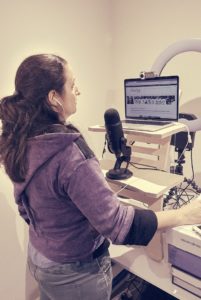Our lives are becoming increasingly impacted by voice and audio technology, something I discuss frequently on The Creative Penn Podcast. Today, author and podcaster, Paul Sating shares why it’s a good idea for authors to podcast, and how it can help with book sales.
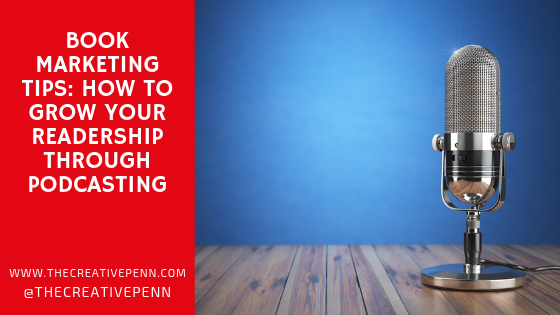 It’s difficult to get published but finding a reader base for your books can be even more challenging.
It’s difficult to get published but finding a reader base for your books can be even more challenging.
Maybe you’ve leveraged every tactic known to ‘writerhood’; newsletters, blogs, paid ads, and various writer-centric websites aimed at readership.
Even writing nonfiction books isn’t a guaranteed path to market awareness of your brand. The challenge of finding readers, standing out from the crowd, becomes more difficult as the crowd swells.
But what can a writer do? After all, there are only so many avenues available to us. The good news is, publishing is a long road, but it is a road with numerous branches that can help us reach our goal of finding new readers.
One way to create a unique presence is by sharing your voice with the world by starting your own podcast. Now, before you say you couldn’t possibly podcast, allow me to tell you how it’s not as difficult as it may first appear and why you might want to consider getting into this medium.
Reasons to Podcast
- Anyone can do it (yes, even you).
- It can expand your author/book brand exponentially.
- It’s relatively cheap (especially compared to book covers and editors).
It requires determination to publish and now I’m asking you to be as determined in believing you can podcast. Many people think it’s too technical, but if you have a computer, Internet connection, and a recording device, you can podcast.
Lack of experience can easily be overcome and don’t worry about the sound of your voice (no one enjoys hearing their own).
The podcast space is an open and friendly space. Plenty of experienced podcasters are more than willing to provide advice and audiences know most of us are hobbyists. They are patient and supportive.
You don’t need the sheen of a highly-produced Hollywood product for thousands of people to enjoy listening to your show. With drive and dedication, your sound and production will consistently improve, a feature of this medium that is uniquely positive.
Fans actually celebrate the improvement over time of the shows they love. It’s a truly empowering experience.
No one expects you to sound like a professional studio and the podcast market is looking for genuine personalities to connect with. Make that be you.
Still not convinced?
Consider the flooded book market, with millions of titles and thousands added every month.
Standing out from the crowd is becoming increasingly difficult. Starting your own podcast creates exposure for your books like no other writer activity.
[Note from Joanna: I talk about this kind of voice branding in my podcast episode about narrating your own audiobooks.]
How Podcasting Can Increase Your Brand Exposure
Leading to a larger fan base, many of whom will read your books.
1. Intimacy
Podcasts are a dynamic medium that allows you to connect with fans (as a creator and as a person) on a deep level. When you podcast, you know you’re speaking to hundreds or even thousands of people, but they know you’re speaking directly to them.
That connection can be incredibly strong. Many fans identify as “friends” of their favorite podcasters, even if they’ve never met them.
2. Accessibility
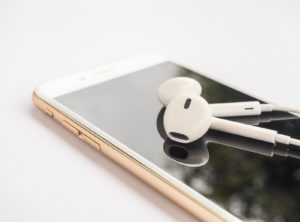 We’re busy people with busy lives. A considerable strength of audiobooks is that they’re mobile – friendly. People can listen wherever they are and whatever they’re doing.
We’re busy people with busy lives. A considerable strength of audiobooks is that they’re mobile – friendly. People can listen wherever they are and whatever they’re doing.
Podcasts share that strength. People cannot stop to read your blog or your interview when they’re at the job or working out at the gym. But they can listen to your podcast while doing those things. You become ever-present in their daily lives and, over time, part of their routine—you can’t put a price on that.
Lastly, the explosion of reliable podcatchers (apps users listen to podcasts) allows for a permanent on-demand existence for your content.
3. Flexibility
A podcast platform gives you the ability to be responsive to fans by quickly publishing content that is relevant to them or the latest trends.
The very fluid nature of podcasting allows you to release episodes when they are timely and topical, dropping them into millions of devices around the world.
And you’re not ‘stuck’ in what you first create. The medium is structured for easy transitions between podcast categories (fiction, nonfiction, business, self-help, etc.).
What is your niche?
Even with an estimated 500,000 podcasts in the space, there is still room for you. Though those numbers sound intimidating, it pales in comparison to the number of book titles. The key is to identify a niche that works for you (your book publishing strategy/goals).
By identifying a niche market, you can carve out a following by leveraging social media and “Also Listens” (podcast equivalent to Amazon “Also Boughts”). The best part? You can do this organically (for free) over time.
How To Begin
And that brings me to my last point. Starting your own podcast can be done cheaply — you only need an Internet connection, computer, a DAW (digital audio workstation — more about this in a moment) and a mic (and you can always add equipment if you choose to take this more seriously in the future).
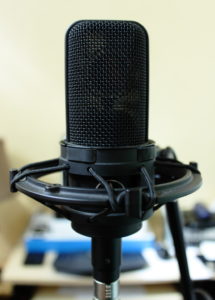 Mics aren’t scary and you don’t need to be a sound pro to find one that will suit your needs. In fact, great starter USB microphones (plugged directly into your computer’s USB drive) can be found for less than $100. A decent mic can last well over a decade (can you say the same for your book covers?).
Mics aren’t scary and you don’t need to be a sound pro to find one that will suit your needs. In fact, great starter USB microphones (plugged directly into your computer’s USB drive) can be found for less than $100. A decent mic can last well over a decade (can you say the same for your book covers?).
[Note from Joanna: for more information on audio set-up for an author, check out this post from Dan Van Werkhoven, the ‘sound guy’ for The Creative Penn Podcast.]
Great starter DAW software (like Audacity) is available for free. Though I upgraded to an Adobe product years ago, I know many successful podcasters who still use Audacity (or Garageband, the Apple equivalent).
The only other cost associated with podcasting (besides time) will be your hosting fees (which can range from free for to roughly $25/month, depending on your needs).
These costs are greatly outweighed by the exposure you’ll earn.
Don’t let fear of the unknown discourage you
There are plenty of resources available to help you get started. Many are free. YouTube is a wonderful place to find free educational resources for all skill levels. Just about any social media platform has a wealth of podcast communities with experienced podcasters were willing to help. You won’t be alone.
Audio is a growing marketplace. With our mobile lifestyle and content saturation, it’s important to not get left behind. For writers who want to obtain/maintain front-of-mind-awareness for readers, podcasting is the next natural step in this evolving marketplace.
If you’re looking to stand out, to grow and strengthen your relationship with your readers, build a unique brand presence, and have a consistent platform to cross-medium promote your books (for free), look no further.
You work hard on your books and they deserve to be in the hands of as many people as possible. Hosting your own podcast can not only be the most effective and cost-efficient way of marketing you and your books; it’s actually incredibly fun.
For many authors who podcast, it doesn’t even feel like marketing. Raising awareness, carving out a niche, building bridges to new readers, all while having fun?
What’s stopping you?
Have you thought about starting your own podcast? Please leave your thoughts below and join the conversation.

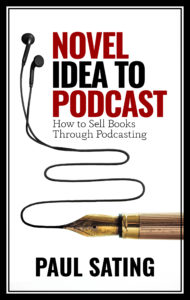 Paul Sating has been podcasting for 9 years with over a million downloads and published his first 3 books in 2018. He writes horror, thrillers, and is currently working on an epic fantasy series.
Paul Sating has been podcasting for 9 years with over a million downloads and published his first 3 books in 2018. He writes horror, thrillers, and is currently working on an epic fantasy series.
Find his podcasts and books at paulsating.com. Connect on Twitter and Instagram at @paulsating.

